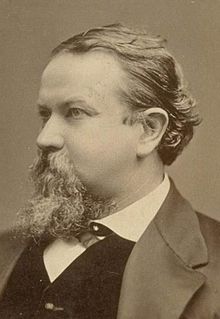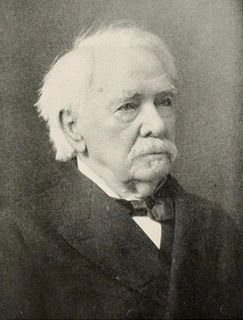
Lecompton is a city in Douglas County, Kansas, United States. As of the 2010 census, the city population was 625.
The history of Kansas, argued historian Carl L. Becker a century ago, reflects American ideals. He wrote:
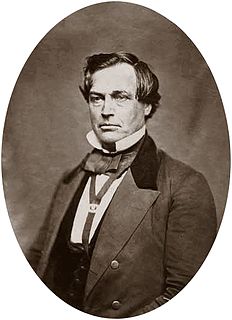
James William "Jim" Denver was an American politician, soldier and lawyer. He served in the California state government, as an officer in the United States Army in two wars, and as a Democratic member of the United States House of Representatives from California. He served as secretary and Governor of the Kansas Territory during the struggle over whether or not Kansas would be open to slavery. The city of Denver, Colorado, is named after him.
The Wyandotte Constitution admitted Kansas as a free state, although it was not the first choice. There were four constitutions made for Kansans to vote on, the Topeka Constitution, the Leavenworth Constitution, the Lecompton Constitution and the Wyandotte Constitution. After voting took place in a climate of intimidation and open violence, the Lecompton Constitution was voted to be the constitution of Kansas, and would have made Kansas a slave state. All that was left to do was send it to Washington D.C. After a rigorous national debate over the topic, it was overruled. The people of Kansas were set to vote on the four constitutions again. After another voting session, The Wyandotte Constitution was to be voted as the constitution of Kansas. Washington approved it and it was set, The Wyandotte Constitution was the constitution for Kansas.
The Topeka Constitutional Convention met from October 23 to Nov 11, 1855 in Topeka, Kansas Territory at Constitution Hall. It drafted the Topeka Constitution that would have banned slavery in Kansas. The convention was organized by Free-Staters to counter the pro slavery Territorial legislature elected March 5, 1855 in polling suffering widely from electoral fraud and the intimidation of free state settlers.
The Leavenworth Constitution was one of four Kansas state constitutions proposed during the era of Bleeding Kansas. The Leavenworth Constitution was drafted by a convention of Free-Staters, and was the most progressive of the four proposed constitutions. The conspicuous aspects of this Constitution were a Bill of Rights that referred to "all men", the banning of slavery from the state, and a basic framework for the rights of women.
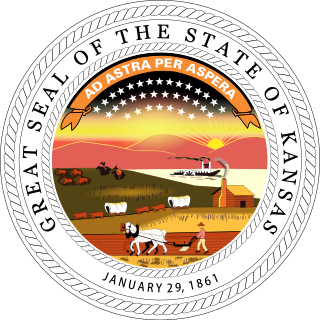
The Kansas Legislature is the state legislature of the U.S. state of Kansas. It is a bicameral assembly, composed of the lower Kansas House of Representatives, with 125 state representatives, and the upper Kansas Senate, with 40 state senators. Representatives are elected for two-year terms, senators for four-year terms.
John Ritchie was an American abolitionist in Kansas who served in the Union Army during the American Civil War

Free-Staters was the name given to settlers in Kansas Territory during the "Bleeding Kansas" period in the 1850s who opposed the extension of slavery and were in favor of individual liberty. The name derives from the term "free state", that is, a U.S. state without slavery. Another name many Free Staters from Kansas took on was Jayhawker.
The timeline of Kansas details past events that happened in what is present day Kansas. Located on the eastern edge of the Great Plains, the U.S. state of Kansas was the home of sedentary agrarian and hunter-gatherer Native American societies, many of whom hunted American bison. The region first appears in western history in the 16th century at the time of the Spanish conquest of Mexico, when Spanish conquistadores explored the unknown land now known as Kansas. It was later explored by French fur trappers who traded with the Native Americans. It became part of the United States in the Louisiana Purchase of 1803. In the 19th century, the first American explorers designated the area as the "Great American Desert."

The presidency of James Buchanan began on March 4, 1857, when James Buchanan was inaugurated as President of the United States, and ended on March 4, 1861. Buchanan, a Democrat from Pennsylvania, took office as the 15th United States president after defeating former President Millard Fillmore of the American Party, and John C. Frémont of the Republican Party in the 1856 presidential election.

Lecompton Constitution Hall, also known as Constitution Hall, is a building in Lecompton, Kansas that played a role in the long-running Bleeding Kansas crisis. It is operated by the Kansas Historical Society as Constitution Hall State Historic Site.

In the 1856 United States presidential election, California voted for the Democratic nominee, former Secretary of State James Buchanan, over the American Party nominee, former Whig President Millard Fillmore, and the Republican nominee, former U.S. Senator and Military Governor of California John C. Frémont.
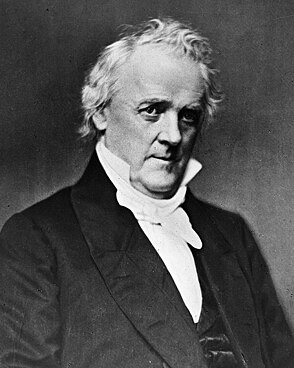
James Buchanan was the 15th president of the United States (1857–1861), serving immediately prior to the American Civil War. A member of the Democratic Party, he was the 17th United States secretary of state and had served in the Senate and House of Representatives before becoming president.

Stephen Arnold Douglas was an American politician and lawyer from Illinois. He was the Democratic Party nominee for president in the 1860 election, but he was defeated by Republican candidate Abraham Lincoln. Douglas had previously bested Lincoln in the 1858 Illinois election for the United States Senate, which is known for the Lincoln–Douglas debates. During the 1850s, Douglas was one of the foremost advocates of popular sovereignty, which held that each territory should be allowed to determine whether to permit slavery within its borders. Douglas was nicknamed the "Little Giant" because he was short in physical stature, but a forceful and dominant figure in politics.

Minneola, Franklin County, Kansas is a ghost town located in northern Franklin County, Kansas. Briefly in the running to be the territorial capital of Kansas, it was located roughly one mile away from Centropolis. Today, hardly anything remains at the original site.

The 1859 California gubernatorial election was held on September 7, 1859 to elect the governor of California.
Barzillai Gray was an American judge. He graduated at the University of Michigan in 1845, A. B., and was admitted to the bar in 1853. He settled in Wyandotte, Kansas but later moved to Leavenworth, Kansas where he was elected judge of the criminal court. In 1876, he was appointed private secretary to Governor George T. Anthony, of Kansas. At the close of Governor Anthony's office, Judge Gray moved once more to Wyandotte, where he held many offices among them that of probate judge. He was, however, best known for his real estate and development plans. He was instrumental in planning several additions and laying out roads and took great interest in the future of that portion of the city known as "Riverview", where an effort was made to establish a market and grain exchange. As territorial attorney for Wyandotte district, Gray was the first man in Kansas to prosecute liquor cases.





